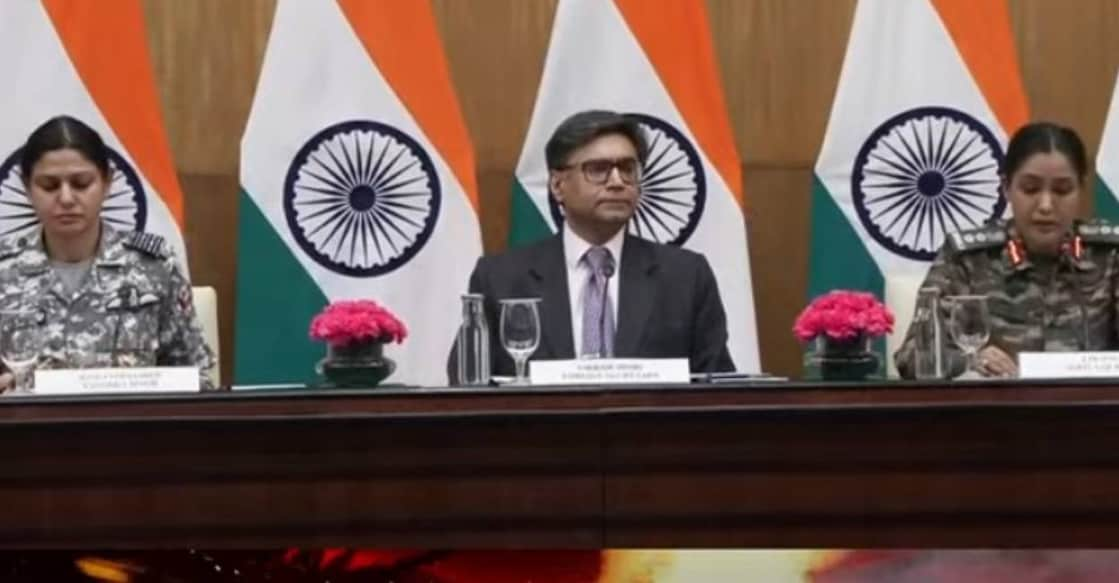'Pakistan instigating communal strife, using civil aircraft as shield against India'

Mail This Article
New Delhi: India made five points, emphasising Pakistan's deception and deadly war tactics, at the May 9 press briefing held in New Delhi to update the nation on Operation Sindoor.
One: In a highly provocative and escalatory move on May 8, Pakistan sneaked into India's air space using a swarm of probably Turkish-made drones, some 300-400 of them, that targeted both civil areas and military installations in 36 locations along the western border; many were neutralised but some fell on Indian soil. Two: One unmanned aerial vehicle (UAV) meant to explode over Bhatinada Military Station, Punjab, was neutralised.
Three: India retaliated with its own set of armed drones targeted at four air defence sites in Pakistan, and one of them destroyed an air defence radar of Pakistan.
Four: After launching air strikes, Pakistan employed the dangerous tactic of using civil airlines as a shield to deter Indian retaliation. Five, Pakistan targeted places of worship in India to instigate communal hostility.
"Along the international border and Line of Control (LoC) (on May 8), drone intrusions were attempted from Leh to Sir Creek at 36 locations with approximately 300-400 drones. The Indian armed forces brought down a number of these drones using kinetic and non-kinetic means," Wing Commander Vyomika Singh and Col Sophia Qureshi said during the briefing. "The possible purpose of these large-scale aerial intrusions was to check the AD (air defence) systems and gather intelligence," they added.
Forensic examination of the drone debris has thrown up the possibility that these drones could be Asisguard Songar drones, asymmetric warfare equipment indigenously built by Turkey. One UAV that targeted Bhatinda was nullified. The Indian drone response caused the destruction of one of Pakistan's air defence radars.
"Pakistan also carried out artillery shelling across the LoC using heavy calibre artillery gun and armed drones at Dhungar, Uri, Poonch, Mendhar, Rajouri, Akhnoor and Udhampur in Jammu and Kashmir area, which resulted in some losses to Indian army personnel. Pakistan army also suffered major losses in India retaliatory fire," the army spokeswomen said.
They also explained how Pakistan was using innocent civilians to deter Indian attacks. "Pakistan's irresponsible behaviour once again came to the fore. Pakistan did not close its civil airspace despite it launching a failed and unprovoked drone and missile attack on May 7 at 8.30 p.m. Pakistan is using civil airliners as a shield knowing fully well that its attack on India would elicit a swift air defence response. This is not safe for the unsuspecting civil airliners, including the international flights which were flying between India and Pakistan," the spokeswomen said.
They also displayed a map showing a "high defence alert situation" in the Punjab sector. The air space on the Indian side has no civil air traffic. However, on the Pakistan side, there are civil airlines flying the air route between Karachi and Lahore. On the map was highlighted an aircraft airbus 320 of Flynas Aviation that took off from Dammam in Saudi Arabia at 5.50 p.m. and landed in Lahore at 9.10 p.m., a time when the Pakistan air space was potentially vulnerable to Indian attack.
"Indian Armed Forces demonstrated considerable restraint in its response, thus ensuring safety of international civil carriers," the spokeswomen said.
Foreign secretary Vikram Misri said that the Indian armed forces responded "proportionately, adequately and responsibly". He termed the Pakistani denial of its attacks along the western border as "yet another example of their duplicity and the new depths they are plumbing in their quest for disinformation".
He said the Pakistani claim that it had not attacked places of worship was yet another bunch of lies. He said the Gurudwara in Poonch was attacked by Pakistan. "Instead of owning up to these attacks, Pakistan made the preposterous and outrageous claim that it was the Indian Armed Forces that were targeting cities like Amritsar and trying to put the blame on Pakistan," Misri said.
The foreign secretary said that such misinformation was "true to type in its efforts to deceive and mislead the world". "That we would attack our own cities is the kind of deranged fantasy that only the Pakistani state can come up with. Perhaps they do it because they are well versed in such action as their history would show," he said.
The foreign secretary said that India had "information" about Pakistani shelling that caused loss of lives and damage to Christian schools. "A shell fired from Pakistan landed just behind the Christ school run by the Carmelites of Mary Immaculate congregation in Poonch. Tragically, the shells fell on the home of two students of the school. Both have lost their lives. Their parents have been severely injured," Misri said.
Another round of Pakistani shelling damaged a Christian convent run by nuns belonging to the congregation of the Mother of Carmel. "Several priests, nuns, school staff and local residents took refuge in an underground hall beneath the Christ school during the shelling by Pakistan. The school happened to be closed at that time, fortunately. Otherwise, more losses would have occurred," the foreign secretary said.
He said that Pakistan, like it tried in Pahalgam, was trying desperately to impart a communal hue to the situation with an intention to create discord. "Again, we are not surprised. India's steadfast unity, in itself, is a challenge to Pakistan," he said, and added: " This is a new low even for Pakistan."

